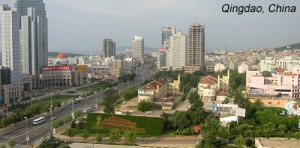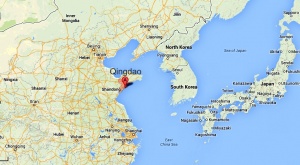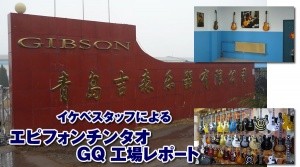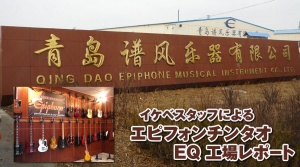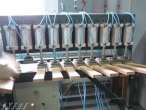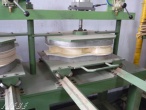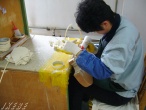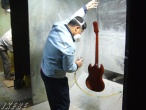Qingdao
|
This page focuses mainly on Epiphone guitars made at the Qindao factories in China. For more information pertaining to the city of Qingdao not relating to Epiphone, click on the "Qingdao, China" link to wikipedia below.
Qingdao, ChinaQingdao, historically known as Tsingtao, is a major city in eastern Shandong Province, Eastern China, with a population of over 8.715 million. Its built up area, made of 6 urban districts and 4 county-level cities, is home to about 4,896,000 inhabitants in 2010. Lying across the Shandong Peninsula while looking out to the Yellow Sea, Qingdao is a major seaport, naval base, and industrial centre. It is also the site of the Tsingtao Brewery. The world's longest sea bridge, the Jiaozhou Bay Bridge, links the main urban area of Qingdao with Huangdao district, straddling the Jiaozhou Bay sea areas. Qingdao is named China's most livable city. An important region in Eastern China, Shandong Province has seen substantial change in its economic landscape in recent years. Much of this development has been concentrated in Qingdao. Internationally, Qingdao is perhaps best known for its Tsingtao Brewery, founded by a German-British joint venture in 1903 that produces Tsingtao beer, the best-known Chinese export beer. It is also home to Haier, a large white goods manufacturer, and Hisense, a major electronics company. In 2002 guitar manufacturers Epiphone opened a factory in Qingdao.
EpiphoneEpiphone has outsourced manufacturing of several guitar models to China on and off since roughly 1995, as well as a few models being made in Taiwan in the late 1970's through the early 1980's. During this time, most manufaturing was done in Korea with the exception of the 1970-1985 models when most production was done in Japan. Prior to opening the Qingdao factories, Epiphone guitars manufactured in China were made at factories such as Dongbei, Daewon, Muse, Mirr, Saejung, Unsung-China and others. These factories were used mainly to meet production demands on higher volume orders, as well as certain models made specifically in and for China. Typically, but not always, lower end models were made in China or Indonesia unless Korean manufacturers needed help meeting large orders on higher end instruments due to demand. While Epiphone still produces some guitars in Indonesia, as well as Korea and Japan, it is unknown if Epiphone still utilizes other Chinese contractors to produce Epiphone instruments. These other factories are most likely contracted to produce intruments for other companies under the Gibson Family of Brands, such as Baldwin pianos which are made at the DaeWon factory in Dalian, China. |
Gibson Qingdao
|
Prior to opening the Gibson Qingdao factory, Epiphone guitars were produced mainly in countries such as Korea and Indonesia. In an attempt to source better parts and acheive better quality control, in 1992 Epiphone established the first permanent presence by an American guitar brand with the opening of the Epiphone Korea office. Though this helped to increase quaility control, as well as the quality of sourced parts, ultimately Epiphone wanted a dedicated factory with Epiphone employees making only Epiphone guitars. In 2002 Epiphone opened the Gibson Qingdao plant dedicated to making only Epiphone instruments. The process leading to the opening of Gibson Qingdao was headed by Gibson luthier Mike Voltz and a team of Epiphone employees. The Gibson Qingdao plant currently employs approximately 550 people with over 450 people involved in direct labor. The Gibson Qingdao plant, while initially manufacturing a variety of Epiphone guitars, is now mainly dedicated to the production of acoustic models. One example of acoustic guitar models dedicated to the Gibson Qingdao factory are the Masterbilt acoustics. Though now mostly dicsontinued, the entire line of Masterbilt acoustics were produced at Gibson Qingdao from the beginning of the run and were some of the first guitars manufactured at the Gibson Qingdao factory. From 2002 until sometime in 2012, Epiphone acoustic guitars made at Gibson Qingdao were stamped with the letter designation "EA" (Epiphone Acoustic) at the beginning of the serial number to indicate their factory of origin. Sometime during 2012 Epiphone changed the serial number pattern and dropped all letter designations from their serials in an attempt to thwart counterfeiters. It is also believed that Epiphone changed the serial system due to the stigma of Chinese-made products. Though there were many quality issues surrounding these Qingdao-made Epiphones during the first few years, overall quality has improved drastically. As well, both Qingdao factories are quickly gaining a reputation for putting out high-quality guitars with a budget price. |
Epiphone Qingdao
|
With the success of the Gibson Qingdao factory, in 2006 Epiphone opened up the Epiphone Qingdao factory in China. The Epiphone Qingdao factory's primary function is to produce electric solid body and archtop guitars. With a handfull of guitars still being produced in Korea, Indonesia and Japan (Elitist Series), and the all but discontinuation of Epiphone's acoustic line for the time being, it appears that the bulk of Epiphone instruments are currently manufactured at the Epiphone Qingdao plant. Though we cant say for certain where Epiphone's blugrass instruments fall in to place between the two factories at this time. Much like the Gibson Qingdao plant, Epiphone Qingdao experienced a rash of quality control issues at the beginning of their venture. In the past several years, quality control, and quality in general, has once again improved substantially. Though Epiphone players seem to lean toward the older, korean and Japanese Epiphones due to stigma and quality issues, it is a well known fact that the Korean, Indonesian and Japanese factories grappled with these same quality issues during their first few years. While the early Korean and Indonesian instruments were hit and miss concerning quality, the early Japanese Epiphones were mostly a miss, almost to the point of Epiphone falling in to obscurity. In 2011, Epiphone released a run of guitars specifically for the Chinese domestic market. The main differences seperating these guitars from guitars for export were open-coil pickup, dot fingerboard markers, and the coveted Gibson-style open-book headstock. These models consisted of the Les Paul Standard, Les Paul Studio, G-400, ES-339 and the Melody Maker, which has never been produced by Epiphone except for this run. Instead of the open-book headstock for the Melody maker, Epiphone China used the traditional Melody Maker headstock also found on the Gibson version. One notalble difference between the Epiphone Melody Maker and the Gibson counterpart, is the absence of a Melody Maker pickup in the neck position. On close inspection, it is apparent that the neck pickup cavity is covered by a pickup-shaped plate inscribed with "Melody Maker. This Chinese Domestic run of guitars was made in limited numbers and only ran for the 2011 model year. |
Electrics | Archtops | Acoustics | Basses | Bluegrass | Amplifiers | Promotional Guitars
